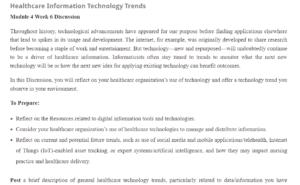Healthcare Information Technology Trends
There is no question that technology is transforming the healthcare sector in the most profound way, improving not only the safety of care but also reducing medical costs as well as medication errors (Skiba, 2017). Several new technologies are enhancing data sharing in hospitals and other healthcare settings – allowing doctors and nurses to make precise decisions. One such technology trend that is improving the sharing of information in the healthcare sector is the electronic health record (EHR). In simple terms, EHRs are just patient files (which contain critical information like medications, demographics, treatment histories, laboratory test results, and allergies) that have been digitized, meaning that they are generated, stored, shared, and retrieved via an established network (McGonigle & Mastrian, 2017). Today, most hospitals and care institutions are transitioning from a paper-based system to EHRs to improve efficiency and accuracy in data sharing and reduce medication errors.
However, just like other technologies that use networks to share information, there is one inherent risk of using EHRs – the danger of private patient information/data falling into the hands of hackers and cybercriminals. This often compromises the integrity and confidentiality of patient information and, sometimes, can damage the reputation of a care facility. In the U.S., the 1996 Health Insurance Portability and Accountability Act (HIPAA) is the main piece of legislation that shields the sharing of health information, giving people the right to their healthcare information/data (Moore & Frye, 2019). Besides, this Privacy Law restricts the manner in which patient data can be shared or used. This means that healthcare workers are prohibited from sharing patient data without their consent. A breach of this rule can be subject to court litigations, and if found culpable, the health institutions or medical practitioners found responsible can sometimes find their practicing licenses revoked or compelled to pay the aggrieved patients.
In addition to EHRs, I think the next big thing in healthcare technology that is likely going to shake up the nursing practice is artificial intelligence (AI). Just like AI is significantly transforming the policing industry (by introducing high-intensity cameras that use facial recognition) as well as the investment sector (by bringing forth modern algorithms with human-like abilities to read and analyze market trends within seconds), artificial intelligence is expected to have a huge impact in the nursing practice. From helping nurses diagnose complex diseases, such as cancer, to assisting people to participate in the management of their health proactively, AI is more likely, than anything else, going to change the nursing practice. One particular area that AI is likely going to shape is clinical decision support systems. In fact, with AI touted to create a more robust framework that analyzes data accurately, smartly, and fast, decision support systems are expected to get more efficient and precise (Cohn, 2013). Several tech companies, such as IBM, Microsoft, Google, and Alibaba, are currently spearheading projects that can revolutionize the diagnosis and sharing of data.
References
Cohn, J. (2013). The robot will see you now. The Atlantic. https://www.theatlantic.com/magazine/archive/2013/03/the-robot-will-see-you-now/309216/
McGonigle, D., & Mastrian, K. G. (2017). Nursing informatics and the foundation of knowledge (4th ed.). Burlington, MA: Jones & Bartlett Learning.
Moore, W., & Frye, S. A. (2019). A review of the HIPAA, Part 1: History, PH1, and privacy and security rules. Journal of Nuclear Medicine Technology, 47,265-266. Retrieved from http://tech.snmjournals.org/content/early/2019/06/06/jnmt.119.227819.abstract
Skiba, D. (2017). Evaluation tools to appraise social media and mobile applications. Informatics, 4(3), 32–40. doi:10.3390/informatics4030032
ORDER A PLAGIARISM-FREE PAPER HERE
We’ll write everything from scratch
Question 
Healthcare Information Technology Trends
Module 4 Week 6 Discussion
Throughout history, technological advancements have appeared for one purpose before finding applications elsewhere that lead to spikes in its usage and development. The internet, for example, was originally developed to share research before becoming a staple of work and entertainment. But technology—new and repurposed—will undoubtedly continue to be a driver of healthcare information. Informaticists often stay tuned to trends to monitor what the next new technology will be or how the next new idea for applying existing technology can benefit outcomes.
In this Discussion, you will reflect on your healthcare organization’s use of technology and offer a technology trend you observe in your environment.
To Prepare:

Healthcare Information Technology Trends
- Reflect on the Resources related to digital information tools and technologies.
- Consider your healthcare organization’s use of healthcare technologies to manage and distribute information.
- Reflect on current and potential future trends, such as use of social media and mobile applications/telehealth, Internet of Things (IoT)-enabled asset tracking, or expert systems/artificial intelligence, and how they may impact nursing practice and healthcare delivery.
Post a brief description of general healthcare technology trends, particularly related to data/information you have observed in use in your healthcare organization or nursing practice. Describe any potential challenges or risks that may be inherent in the technologies associated with these trends you described. Then, describe at least one
potential benefit and one potential risk associated with data safety, legislation, and patient care for the technologies you described. Next, explain which healthcare technology trends you believe are most promising for impacting healthcare technology in nursing practice and explain why. Describe whether this promise will contribute to improvements in patient care outcomes, efficiencies, or data management. Be specific and provide examples.
